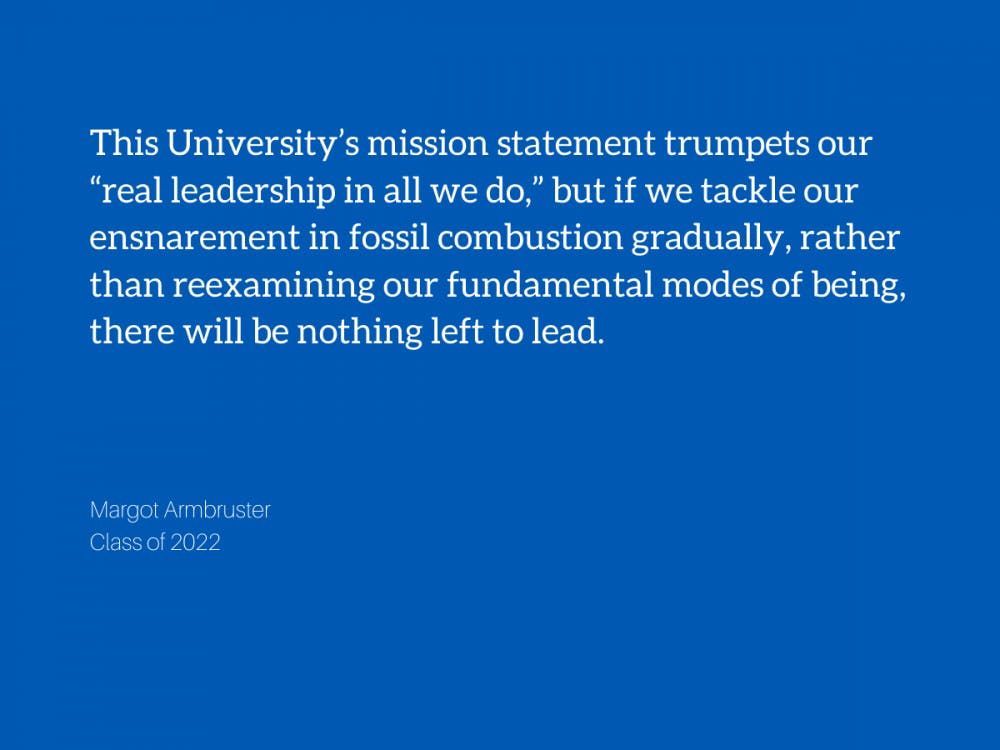“Some investments are quite profitable,” Dr. Lawrence Baxter, Duke Law professor and chairman of Duke’s Advisory Committee on Investment Responsibility (ACIR), stated at ACIR’s 2019 fall forum, “even though they are borderline uncomfortable for us.”
ACIR recently rejected—for the second time in five years—student demands that Duke divest from its fossil fuel investments. This decision is an affront to the values Duke claims to prioritize.
Confidentiality prevents members of the ACIR, which reports to President Price and the Board of Trustees on social responsibility in Duke University’s endowment, from discussing specific endowment holdings, but Baxter cited British Petroleum (BP) as an example of an energy firm Duke might support, given its investment in renewables.
I may be too young to drink or rent a car, but I remember 2010, when BP’s negligence caused the Deepwater Horizon disaster, the largest marine oil spill in history and an entirely preventable catastrophe. In the years since this incident, since a 2006 Alaskan oil spill and a 2005 Texas refinery explosion which killed 15 workers, BP has launched a remarkably successful campaign to convince the public that it is transitioning in good faith from fossil fuels to renewable energy.
Last year, BP’s CEO told Reuters that, of its $15 to $17 billion operating budget, just $500 million contributes to renewables. Generously calculated, that’s about three percent.
Baxter, Senior Vice President Richard Riddell and Anil Madhok, COO of DUMAC, the firm which invests Duke’s endowment, took care to emphasize that Duke directs a “slim” percentage of its assets towards fossil fuel-related activities. Maybe $30 million, Madhok estimated. The adults in the room seemed insensible to how ridiculous this number—the full cost of four years’ Duke tuition, fees and room and board for over 100 students—sounded.
If Duke’s fossil fuel investments are as insignificant as Madhok claims, what is the stumbling block preventing their removal?
The ACIR in 2014 and 2019 politely declined proposals from Divest Duke and Duke Climate Coalition (DCC), which absorbed Divest Duke, to divest from its holdings in fossil fuels. Baxter explained that Duke has more financial skin in the game than other universities which have met student divestment demands, also commenting that symbolic divestment may restrict debate or obstruct the issue’s complexity. (I am a current DCC member, but my opinions are purely my own.)
Divestment would be enormously meaningful from Duke precisely because it requires financial sacrifice. Duke divested previously from conflict minerals and products of apartheid South Africa over concerns about the violence their manufacture implicated, but where is this pacifism when it comes to the millions of refugees that climate crisis will produce by midcentury? If we only live our values when the decisions we face are easy and the financial trade-offs slight, are they even our values at all?
Defending Duke’s policy, ACIR members cited campus sustainability campaigns, an area of demonstrated strength. Duke has long been pursuing a 2024 carbon neutrality goal, and a 2019 update to the university Climate Action Plan (CAP) reports that, given investments in energy efficiency and an eastern NC “carbon farm,” Duke’s net emissions are on track to fall 78% from 2009 levels. It’s not a perfect victory, however, especially given that Duke will recoup its remaining 22% of emissions using carbon offsets—investments in renewable energy which, though laudable, decouple environmental restoration projects from the sites where emissions occur. The CAP also fails to account for emissions through the Duke Health system.
Most troublingly, the 2019 CAP update affirms that Duke “receives nearly all of its electricity needs from Duke Energy,” a J.B. Duke-founded local energy monopoly, second-heaviest American polluter (2015) and perpetrator of the third-largest carcinogenic coal ash spill in U.S. history. Like BP, Duke Energy poses as a renewables champion but has actively subverted the expansion of clean energy throughout its territory.
State law enshrines the University-environmental criminal relationship by barring electricity purchases from any other source, leaving Duke in an unenviable position (though the CAP does note and plan Duke’s potential to introduce renewables on campus). But our entanglement with Duke Energy reaches deeper than simple finances: at least one DUMAC liaison has worked for Duke Energy. During this week’s forum, ACIR announced its proposal to leverage Duke’s stakeholder power for clean energy advocacy. We must not allow crony relationships to hold back this plan, which could be transformative if fiercely pursued.
As I come of age during this terrifying time, I need my university to be a voice of moral clarity. Duke must divest from fossil fuels—the choice to do so would be both symbolic and significant. Duke must hold Duke Energy accountable. More importantly still, given that, as postcolonial theorist Dipesh Chakrabarty has written, our “mansion of [….] freedoms stands on an ever-expanding base of fossil fuel use,” Duke has a responsibility to help us dream differently.
This University’s mission statement trumpets our “real leadership in all we do,” but if we tackle our ensnarement in fossil combustion gradually, rather than reexamining our fundamental modes of being, there will be nothing left to lead. Duke can start by adding an undergraduate environmental history graduation requirement, investing in community resilience practices for the century ahead, and shining an unflinching light on how climate crisis will impact every department at this university and every facet of our lives.
So as climate crisis chokes off our food supply, endangers the most vulnerable and lowest-emitting populations, and sets fire to our world, which history is Duke writing? Will our descendants remember us for acting morally in the age of paralysis, or will our choices continue to poison us all?
Margot Armbruster is a Trinity sophomore. Her column typically runs on alternate Mondays.
Get The Chronicle straight to your inbox
Sign up for our weekly newsletter. Cancel at any time.

Margot Armbruster is a Trinity senior and opinion editor of The Chronicle's 117th volume.

